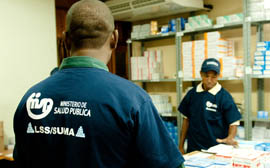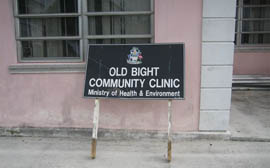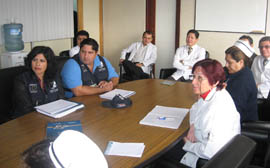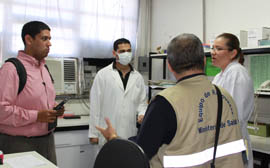
Logistic support system helps in supply management  After the first cases of cholera were detected in Haiti, the Dominican Republic's Ministry of Health advocated that having access to the necessary supplies to treat the disease was crucial for the rapid response to cases in its territory. To that end, the Ministry launched a project for strengthening logistic capacity and optimizing supply management, using LSS/SUMA as a model. After the first cases of cholera were detected in Haiti, the Dominican Republic's Ministry of Health advocated that having access to the necessary supplies to treat the disease was crucial for the rapid response to cases in its territory. To that end, the Ministry launched a project for strengthening logistic capacity and optimizing supply management, using LSS/SUMA as a model.
As a first step, a strategic warehouse was established to serve the demand for cholera treatment supplies, and for emergencies and disasters. A network of regional warehouses was then created so that the supplies could be mobilized quickly to where they were required, and finally, it was decided that logistics capacity in the management of Ministry of Health supplies should be improved. This network of warehouses offers accurate information on the distribution of supplies at the national level, deliveries to health centers, immediate needs for decision-making, and assigning resources to meet the demands. LSS/SUMA has also helped in using resources properly, transparency in supply management, and control in drug rotation, which avoids waste due to expiration dates. Write to venegasj@paho.org for additional information. 
Response Activities Continue in The Bahamas  PAHO/WHO's Regional Response Team was mobilized to The Bahamas, after the passage of Hurricane Irene, to support the Ministry of Health in damage assessment, environmental health, water and sanitation, epidemiology, vector control, evaluation of hospitals, and coordination. PAHO/WHO's Regional Response Team was mobilized to The Bahamas, after the passage of Hurricane Irene, to support the Ministry of Health in damage assessment, environmental health, water and sanitation, epidemiology, vector control, evaluation of hospitals, and coordination.
An epidemiologist was deployed to help in the design and multisectoral coordination of a dengue campaign, and to strengthen the Ministry's program of epidemiological surveillance. Two specialists—in dengue and vector control—are also helping in this activity. Waste collection is a particularly important challenge for health authorities because the country is facing a dengue outbreak. At least 11 of the 16 health facilities in the islands of Abaco, Acklins & Crooked, Cat, Long, and New Providence suffered damage that included flooding, damage to ceilings, equipment and electric generators, contamination of wells, and failures in the water and electric supply systems. The main hospital in The Bahamas, located in Nassau, was also affected. Write to vanalphe@paho.org for additional information on the response in The Bahamas. |

 After the first cases of cholera were detected in Haiti, the Dominican Republic's Ministry of Health advocated that having access to the necessary supplies to treat the disease was crucial for the rapid response to cases in its territory. To that end, the Ministry launched a project for strengthening logistic capacity and optimizing supply management, using LSS/SUMA as a model.
After the first cases of cholera were detected in Haiti, the Dominican Republic's Ministry of Health advocated that having access to the necessary supplies to treat the disease was crucial for the rapid response to cases in its territory. To that end, the Ministry launched a project for strengthening logistic capacity and optimizing supply management, using LSS/SUMA as a model. PAHO/WHO's Regional Response Team was mobilized to The Bahamas, after the passage of Hurricane Irene, to support the Ministry of Health in damage assessment, environmental health, water and sanitation, epidemiology, vector control, evaluation of hospitals, and coordination.
PAHO/WHO's Regional Response Team was mobilized to The Bahamas, after the passage of Hurricane Irene, to support the Ministry of Health in damage assessment, environmental health, water and sanitation, epidemiology, vector control, evaluation of hospitals, and coordination. The Riobamba General Provincial and Teaching Hospital in Riobamba, Ecuador, has undertaken several activities to improve its performance in case of emergencies and disasters. The first was the evaluation of its hospital safety index. Based on the results, it developed action plans for the short-, medium- and long-term.
The Riobamba General Provincial and Teaching Hospital in Riobamba, Ecuador, has undertaken several activities to improve its performance in case of emergencies and disasters. The first was the evaluation of its hospital safety index. Based on the results, it developed action plans for the short-, medium- and long-term.  The Safe Hospitals initiative promoted by PAHO/WHO and its strategic partners has shifted to the academic level, where awareness is raised on the need to make safer health facilities. Agreements made with the University of San Carlos in Guatemala and the Don Bosco University in El Salvador are good examples of this achievement.
The Safe Hospitals initiative promoted by PAHO/WHO and its strategic partners has shifted to the academic level, where awareness is raised on the need to make safer health facilities. Agreements made with the University of San Carlos in Guatemala and the Don Bosco University in El Salvador are good examples of this achievement.

No comments:
Post a Comment